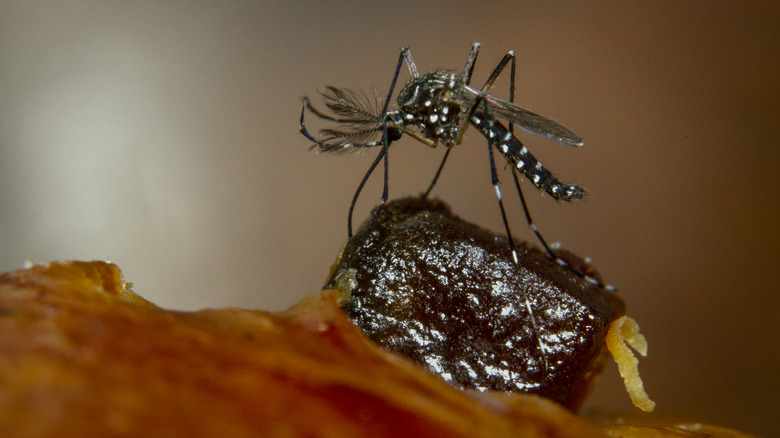Tourists In Las Vegas Have A New Deadly Pest To Worry About Thanks To Climate Change
Climate change isn't only responsible for record-breaking hot temperatures in Las Vegas, but it is also the reason behind another budding menace of Sin City: mosquitoes. If you are shrugging them off as a mild annoyance, the following tidbit will change your mind. According to the CDC, mosquitoes are the world's deadliest animal and cause the most human fatalities out of all other creatures on Earth. And now these bloodsucking pests are on the rise in Clark County (comprising Las Vegas, Laughlin, Henderson, among other Nevada regions).
The growing species include two particularly worrisome kinds. One is the Culex mosquito, which spreads the West Nile virus, and the other is Aedes aegypti, a vector for diseases like dengue, yellow fever, and chikungunya. Note that these mosquitoes aren't born with these diseases, but they do carry them. Meaning they can get infected after biting a person with the particular illness, and once infected, can transmit it to anyone they bite afterwards. For a city that welcomes about 40 million visitors annually, this can easily start a local outbreak.
So, what does this mean for your Vegas plans? Have fun, but be cautious. The Southern Nevada Health District is active in surveillance and press releases, but actually controlling these increasing mosquito populations requires a higher authority that's yet missing in Vegas. To counter, visitors need to create a safe environment for themselves that goes beyond this simple coffee TikTok hack to ward off mosquitoes. Lots of repellent sprays and protective clothing are the first line of defense. If you develop symptoms beyond a simple itch (such as fever, fatigue, or body aches), seek prompt medical attention and receive the necessary care on time.
Las Vegas' mosquito problem is new, but concerning
Mosquitoes tend to be a nuisance in tropical countries (see CDC's list of high dengue-risk beach paradise destinations) or natural environments with readily available still water, but not in arid desert landscapes like Las Vegas and much of Nevada. However, that's changing. A part of the reason is that mosquitoes are genetically adapting to rising temperatures, slapping a high-five back to global warming. Moreover, some mosquitoes (like the dengue-spreading Aedes aegypti) love to be around urban areas and people. Given that Vegas, the most fun city in America, is also one of the nation's fastest-growing urban sprawls, these bloodsucking insects are finding just the ideal conditions to thrive. Further, these mosquitoes are developing resistance to some commonly used insecticides.
Locals have also noticed an uptick in mosquito bites. One conversation in the r/vegaslocals subreddit has many residents venting their frustration with the surge of mosquito populations and bites. One commenter even mentions that, in his 30 years as a Las Vegas local, he has never experienced anything like this. The "aggressive" bites on the rise in Vegas are often a sign of the Aedes mosquito. They puncture multiple times into the skin and majorly target areas around the ankles. You can spot them by their white-striped legs (although not all mosquitoes with white-striped legs fall under the Aedes species). At the time of this writing, there have been no reported cases of dengue or West Nile virus in Nevada in 2025. The current surge in their carriers only serves as a reminder to stay safe and informed. With necessary precautions, you can enjoy the city's many attractions, like North America's largest observation wheel with stunning skyline views.

